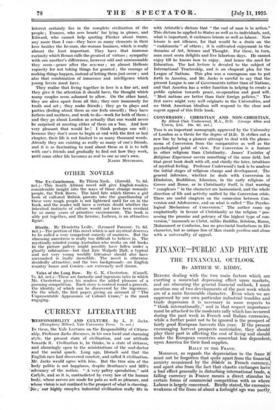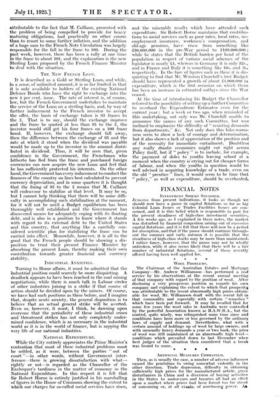FINANCE - PUBLIC AND PRIVATE
THE FINANCIAL OUTLOOK
BY ARTHUR W. KIDDY.
BEFORE dealing with the two main factors which are exerting a somewhat depressing effect upon markets, and are obscuring the general financial outlook, I must mention one of two developments of the past week which are of a more favourable character. Even when we are oppressed by our own particular industrial troubles and trade depression it is necessary in some respects to " think internationally," and in that respect importance must be attached to the moderate rally which has occurred during the past .week in French and Italian•• currencies,' while a further point not to be ignored is the prospect of fairly good European harvests this year. If the present encouraging harvest prospects materialize, they should play their part in affecting the cost of living and shoUld make the European countries somewhat less dependent, upon America for their food supplies. BEFORE dealing with the two main factors which are exerting a somewhat depressing effect upon markets, and are obscuring the general financial outlook, I must mention one of two developments of the past week which are of a more favourable character. Even when we are oppressed by our own particular industrial troubles and trade depression it is necessary in some respects to " think internationally," and in that respect importance must be attached to the moderate rally which has occurred during the past .week in French and Italian•• currencies,' while a further point not to be ignored is the prospect of fairly good European harvests this year. If the present encouraging harvest prospects materialize, they should play their part in affecting the cost of living and shoUld make the European countries somewhat less dependent, upon America for their food supplies.
RALLY IN THE FRANC.
Moreover, as regards the depreciation in the franc it! must not be forgotten that quite apart from the financial, anxiety occasioned by the deb4cle in French currency, and apart also from the fact that chaotic exchanges have. a bad effect generally in, disturbing international trade, a falling currency in France means a direct stimulus to certain forms of commercial competition with us where Labour is largely concerned. Briefly stated, the excessive weakness of the franc of about a fortnight ago was partly; attributable to the fact that M. Caillaux, presented with the problem of being compelled to provide for heavy maturing obligations, had practically no other course than to resort to some further inflation, and the addition of a huge sum to the French Note Circulation was largely responsible for the fall in the franc to 109. During the past week, however, there has been a rally at one time in the franc to about 101, and the explanation is the new Sterling Loan proposed by the French Finance Minister to deal with the situation.
THE NEW FRENCH LOAN.
It is described as a Gold or Sterling Loan, and while, in a sense, of unlimited amount, it is so far limited in that it is only available to holders of the existing National Defence Bonds who have the right to exchange into the new 4 per cent. issue. The rate of interest is, of course, low, but the French Government undertakes to maintain the service of the Loan on a sterling basis, and, by way of further inducement to the French investor to accept the offer, the basis of exchange taken is 95 francs to the £. That is to say, should the exchange improve and the franc be quoted at less than 95 to the £, the investor would still get his four francs on a 100 franc bond. If, however, the exchange should fall away, then the difference between the exchange of 95 and the rate at which it stood when the dividend was payable -would be made up to the investor in the amount distri- buted in dividend. Thus, it will be seen that, given confidence in the Government, the Frenchman who hitherto has fled from the franc and purchased foreign currencies can now acquire the new Loan and feel that he has sufficiently protected his interests. On the other hand, the Government has every inducement to conduct the finances of the country on lines best calculated to prevent currency depreciation, and in some quarters it is thought that the fixing of 95 to the £ means that M. Caillaux will endeavour to stabilize at that level. It may be so, but I cannot help thinking that there will be some diffi- culty in accomplishing such stabilization at the moment, for it will not be until a Budget equilibrium has been thoroughly well established and the Government has discovered means for adequately coping with its floating debt, and is also in a position to know where it stands with regard to its external debt to the United States and this country, that anything like a carefully con- sidered scientific plan for stabilizing the franc can be carried into effect. Meanwhile, however, it is all to the good that the French people should be showing a dis- position to trust their present Finance Minister by absorbing the present Loan, thereby making their own contribution towards greater financial and currency stability.
INDUSTRIAL ANXIETIES.
Turning to Home affairs, it must be admitted that the industrial position could scarcely be more disquieting. A deadlock appears to have been reached in the coal mining negotiations, while there is much talk in Labour circles of other industries joining in a strike if that course of action should be decided upon by the miners. Of course, we have had such positions as these before, and I imagine that, despite acute anxiety, the general disposition is to believe that an actual general strike will be averted. Even so, however, it must, I think, be dawning upon everyone that the periodicity of these industrial crises and threatened strikes has not only completely under- mined confidence, which is as necessary in the industrial world as it is in the world of finance, but is sapping the very life of our national industries.
NATIONAL EXPENDITURE.
While the City entirely appreciates the Prime Minister's contention that most of these industrial problems must be settled, as it were, between the parties " out of court "—in other words, without Government inter- ference—there is growing dissatisfaction with what— rightly or not—is regarded as the Chancellor of the Exchequer's tardiness in the matter of economy in the National Expenditure. In this respect it is felt that Sir Robert Home is entirely justified in his marshalling of figures in the House of Commons showing the extent to • which our charges for so-called social services have risen, and the miserable results which have attended such expenditure. Sir Robert Horne maintains that contribu- tions. to social services such as poor rates, local rates, un- employment insurance, workmen's compensation, and old-age pensions, have risen from something like £30,000,000 in the pre-War period to £169,000,000 ;; while he states that the British burden per head of the population in respect of various social schemes of the legislator is nearly £4, whereas in Germany it is only 32s., and in France and Italy it is something like 16s. and 3s. respectively. In the face of figures such as these it is dis- quieting to find that Mr. 'Winston Churchill's first Budget should have represented a growth of about £4,000,000 in expenditure, which is the first occasion on which there has been an increase in estimated outlays since the War ceased.
At the time of introducing his Budget the Chancellor referred to the possibility of setting up a further Committee to overhaul the Expenditure Estimates even for the current year ; but a week or two ago, when reminded of this undertaking, not only was Mr. Churchill unable to announce the names of any such Committee, but was inclined to emphasize the difficulty of " resisting demands from departments," &c. Not only does this luke-warm- ness seem to show a lack of courage and determination; but it also shows a lack of appreciation of the position and of the necessity for immediate curtailment. Doubtless any really drastic economies might cut right across Policy itself, but if " policy " is to include, for example, the payment of doles to youths leaving school at a moment when the country is crying out for cheaper forms of labour, and when the youths in question would be well advised in acquiring knowledge of a trade, even on the old " prentice " lines, it would seem to be time that " policy," as well as expenditure, should be overhauled.



























































 Previous page
Previous page